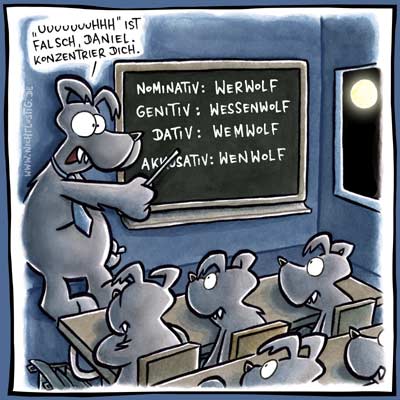Der Werwolf
by Christian Morgenstern
Ein Werwolf eines Nachts entwich
von Weib und Kind, und sich begab
an eines Dorfschullehrers Grab
und bat ihn: “Bitte, beuge mich!”
Der Dorfschulmeister stieg hinauf
auf seines Blechschilds Messingknauf
und sprach zum Wolf, der seine Pfoten
geduldig kreuzte vor dem Toten.
“Der Werwolf” - sprach der gute Mann,
“des Weswolfs, Genitiv sodann,
dem Wemwolf, Dativ, wie man’s nennt,
den Wenwolf, - damit hat’s ein End!”
Dem Werwolf schmeichelten die Fälle
er rollte seine Augenbälle.
“Indessen”, bat er, “füge doch
zur Einzahl auch die Mehrzahl noch!”
Der Dorfschulmeister aber mußte
gestehn, daß er von ihr nichts wusste.
Zwar Wölfe gäb’s in grosser Schar,
doch “Wer” gäb’s nur im Singular.
Der Wolf erhob sich tränenblind -
er hatte ja doch Weib und Kind!
Doch da er kein Gelehrter eben,
so schied er dankend und ergeben.
|
|
The Banshee (An Approach)
by Max Knight
One night, a banshee slunk away
from mate and child, and in the gloom
went to a village teacher’s tomb,
requesting him: “Inflect me, pray.”
The village teacher climbed up straight
upon his grave stone with its plate
and to the apparition said
who meekly knelt before the dead:
“The banSHEE, in the subject’s place;
the banHERS, the possessive case.
The banHER, next, is what they call
objective case--and that is all.”
The banshee marveled at the cases
and writhed with pleasure, making faces,
but said: “You did not add, so far,
the plural to the singular!”
The teacher, though, admitted then
that this was not within his ken.
“While bans are frequent”, he advised,
“A she cannot be plurized.”
The banshee, rising clammily,
wailed: “What about my family?”
Then, being not a learned creature,
said humbly “Thanks” and left the teacher.
|
